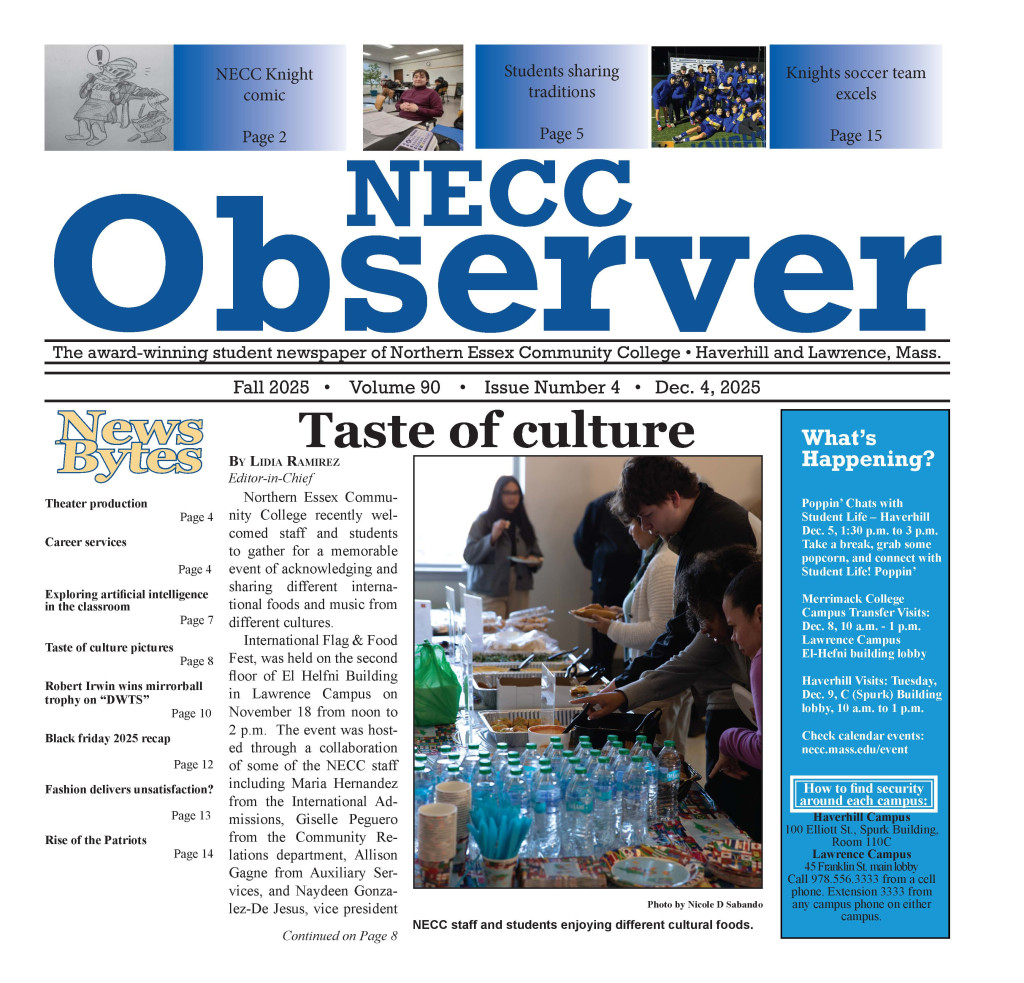With the holiday season approaching, many college students are feeling the weight of added stress, juggling end-of-semester exams, family responsibilities, and financial concerns.
For students dealing with anxiety and depression, this time of year can be particularly challenging. Northern Essex Community College (NECC) offers a range of mental health resources aimed at supporting students through these pressures, providing a foundation for those who may feel overwhelmed during this season.
Across the United States, college students are grappling with an unprecedented mental health crisis.
According to the Healthy Minds Study, 37% of college students report symptoms of anxiety, and 44% report symptoms of depression. Additionally, 15% of students have seriously considered suicide within the past year.
These numbers highlight a growing need for mental health support, intensified by academic pressures, financial responsibilities, and social demands.
With the added stress of the holiday season, many students face unique challenges balancing family expectations and academic obligations.
At NECC, these challenges resonate with a diverse student population, many of whom balance their studies with work and family responsibilities.
The college’s Counseling and Psychological Services offers a range of resources to support students’ personal, social, and academic well-being.
These services include short-term individual counseling, crisis intervention, and referrals to community resources for extended care.
All services are confidential, free, and accessible to students on both the Haverhill and Lawrence campuses.
NECC’s mental health services extend beyond counseling.
The college provides proactive support through workshops and group sessions designed to help students develop essential coping skills and build resilience.
Topics include stress management, relationship skills, and managing anxiety relevant tools for students facing the demands of college life.
“Workshops cover topics such as stress management and relationship-building, equipping students with practical strategies for day-to-day challenges,” according to the NECC Counseling Services website.
As part of its commitment to creating a supportive environment, NECC also offers Mental Health First Aid (MHFA) training to faculty, staff, and students.
This program equips participants with the skills to identify, understand, and respond to signs of mental health challenges and substance use disorders.
Since launching the initiative, over 130 faculty and staff members at NECC have become certified in MHFA, strengthening the college’s support network.
Through MHFA, NECC is empowering its community to assist students in need, aligning with a broader trend in higher education where colleges are training faculty and staff as “first responders” for mental health.
The college’s workshops and events address a variety of stressors. Programs such as National Depression Screening Day, sleep clinics, and anxiety awareness sessions offer students tools to manage mental health concerns, especially during high-stress times like finals and the holiday season.
These workshops provide practical strategies for handling everyday challenges and create opportunities for students to connect with others facing similar issues.
NECC’s Counseling Services highlights these sessions as a way to “help students learn coping mechanisms and build a network of peer support.”
NECC’s approach to mental health involves faculty, staff, and peer mentors, who play a key role in supporting students.
Faculty members and peer mentors are encouraged to recognize signs of distress, such as changes in attendance or academic performance, and to guide students toward available resources. With MHFA-certified faculty and staff, NECC fosters a community where more individuals are prepared to assist students in distress.
This collaborative approach reflects a growing trend among colleges to address mental health collectively, with community members trained to act as the first line of support.
As NECC continues to expand its support for student mental health, the college is also cosponsoring a valuable event for the community.
On November 19, from 7:00 p.m. to 8:30 p.m., at Haverhill campus, TC103, NECC, in partnership with NAMI Northeast Essex and the Essex North DMH site board, will host a panel discussion titled “Mental Health Through the Lens of Education: Success at College is Possible.”
This free workshop invites students, families, educators, and anyone interested to hear stories of hope and resilience. A panel of staff, faculty, and students will share insights on navigating educational challenges, accessing accommodations, planning for the future, and knowing when to seek additional support.
Local mental health organizations will also be present with information on available services, making this an opportunity for attendees to connect with resources beyond the campus.
The event is open to everyone, including high school and college students, veterans, individuals with lived experience, and mental health providers. For more information, contact jfortna@necc.mass.edu.
Through partnerships like this, NECC reinforces its commitment to creating a supportive and informed community, empowering students to pursue their educational goals regardless of mental health challenges.


